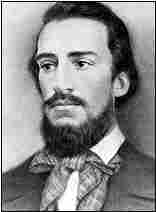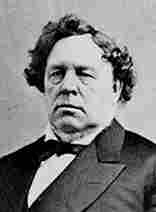Brigham Young's
1872 Troubles
Joseph Smith III was 11 years old when his father the Prophet Joseph Smith, Jr. was killed by a mob in Illinois. His side of the family remained in Nauvoo when the main body of the LDS Church went west. On April 6, 1860 a new church was formed, the Reorganized Church of Jesus Christ of Latter-day Saints, and 27 year-old Joseph III was named President. Though missionaries from both churches despised each other, the Smith families of Utah and Nauvoo enjoyed a warm regard for their relatives. The following letter was written by George A. Smith, then a member of the LDS First Presidency to his 2nd Cousin Joseph Smith III, RLDS President. The book, Brigham's Destroying Angel had not yet been published, but this was the year it would be.
Salt Lake City, U.T., April 25, 1872.
Cousin Joseph Smith:
 Your favor of April 20th is received. The Herald [an RLDS publication] now comes to hand regularly.
Your favor of April 20th is received. The Herald [an RLDS publication] now comes to hand regularly.
 In answer to your inquiry respecting President Young: he was arrested last fall on a charge of "lascivious cohabitation" and allowed bail at $5000.00. He was never informed who the witnesses were that testified against him before the grand jury; he received assurances that his case would not be tried till the spring term of the court; his health being feeble, through age and excessive public speaking, he went to St. George, 350 miles south, to spend the winter in its warm, dry climate; and although there is a tri-weekly mail, and telegraphic connection, it was published by two papers in this city, and extensively abroad, that he had "run away."
In answer to your inquiry respecting President Young: he was arrested last fall on a charge of "lascivious cohabitation" and allowed bail at $5000.00. He was never informed who the witnesses were that testified against him before the grand jury; he received assurances that his case would not be tried till the spring term of the court; his health being feeble, through age and excessive public speaking, he went to St. George, 350 miles south, to spend the winter in its warm, dry climate; and although there is a tri-weekly mail, and telegraphic connection, it was published by two papers in this city, and extensively abroad, that he had "run away."
 In about a month after his departure from this city, it was announced that he had been indicted for murder, and District Attorney Bates, gave notice that he would be placed on trial on the 9th of January, on this charge, although he had not been arrested. On learning this, President Young commenced the return journey of 350 miles, facing northern storms, crossing five ranges of mountains, over horrible roads, and on the day set presented himself to the court. The United States Attorney asked the Judge to admit him to bail, citing the cases of Jefferson Davis, Aaron Burr and other notables as precedents, but Judge McKean refused and committed him to jail in his own house, in charge of a deputy United States Marshal ( Evans), where he has remained till yesterday, when he was discharged on a writ of habeas corpus by Judge Smith.
In about a month after his departure from this city, it was announced that he had been indicted for murder, and District Attorney Bates, gave notice that he would be placed on trial on the 9th of January, on this charge, although he had not been arrested. On learning this, President Young commenced the return journey of 350 miles, facing northern storms, crossing five ranges of mountains, over horrible roads, and on the day set presented himself to the court. The United States Attorney asked the Judge to admit him to bail, citing the cases of Jefferson Davis, Aaron Burr and other notables as precedents, but Judge McKean refused and committed him to jail in his own house, in charge of a deputy United States Marshal ( Evans), where he has remained till yesterday, when he was discharged on a writ of habeas corpus by Judge Smith.
 The Supreme Court of the U.S. had decided that there has not been a lawful grand jury impanneled in Utah for the last two years. The Jury that found the indictment against Brigham Young was carefully packed for that purpose, the only witness, so far as we can learn, was William A. Hickman, who once belonged to the Church, from which he had been severed for several years. He claims to have committed several murders, one of which he charges Prest. Young with being accessory to, that of Richard Yates; a man whose existence was wholly unknown to the President. It is believed that the getters up [p.2] of this indictment promised Hickman a reprieve for a murder concerning which there exists undoubted evidence, provided he would criminate Brigham Young, and without doubt he had formed an alliance with the "ring" whose legal villainy has been so signally exposed by the late unanimous decision of the Supreme Court.
The Supreme Court of the U.S. had decided that there has not been a lawful grand jury impanneled in Utah for the last two years. The Jury that found the indictment against Brigham Young was carefully packed for that purpose, the only witness, so far as we can learn, was William A. Hickman, who once belonged to the Church, from which he had been severed for several years. He claims to have committed several murders, one of which he charges Prest. Young with being accessory to, that of Richard Yates; a man whose existence was wholly unknown to the President. It is believed that the getters up [p.2] of this indictment promised Hickman a reprieve for a murder concerning which there exists undoubted evidence, provided he would criminate Brigham Young, and without doubt he had formed an alliance with the "ring" whose legal villainy has been so signally exposed by the late unanimous decision of the Supreme Court.
Respectfully Yours,
Geo. A. Smith
Journal History of the Church, 26 April 1872, p.1
LDS Division of Church History, Salt Lake City, UT
To learn more about William A. Hickman, click here.
To learn more about the Church of Jesus Christ of Latter-day Saints, click here or here.
The Reorganized LDS Church recently changed its name to Community of Christ; click here.
To return the the Hickman Family index page, click here.
.
George A. Smith
1817-1875
Richard S. Van Wagoner and Steven C. Walker, A Book of Mormons, Signature Books, 1982
Joseph Smith III
1832-1914
Roger D. Launius, Joseph Smith III: Pragmatic Prophet, University of Illinois Press, 1988


